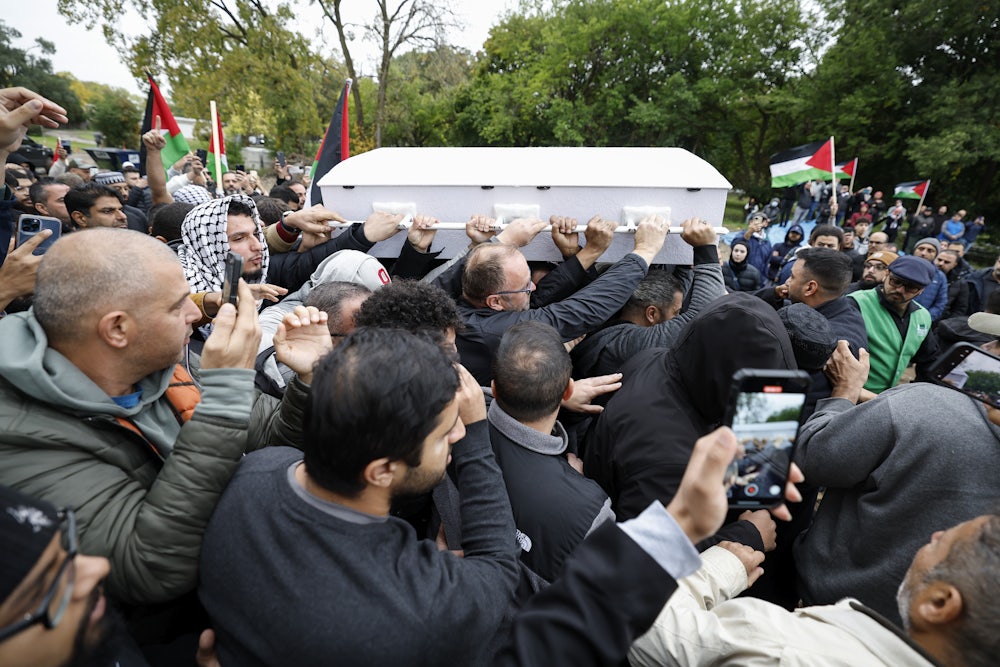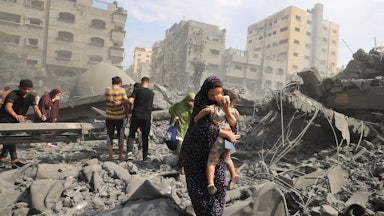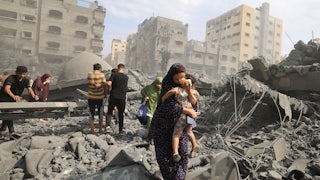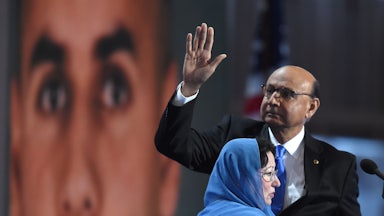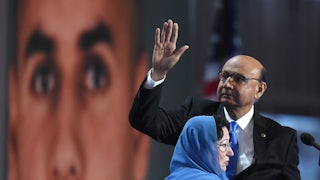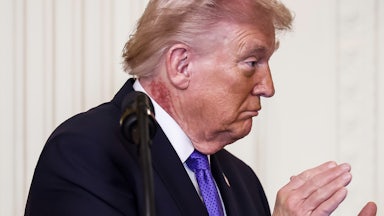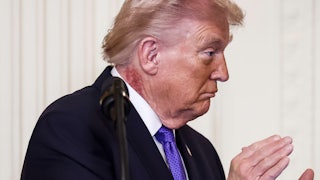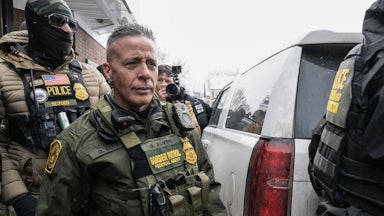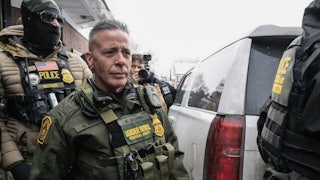Late Saturday morning in a Chicago suburb, a 6-year-old boy was found stabbed to death, his mother seriously wounded. The details of the crime that quickly emerged rhymed with the news cycle in a way that brought familiar dread: The mother and son were targeted by their killer—who turned out to be their landlord—due to their Palestinian and Muslim background. He had been angered by the Hamas attack on Israel nearly two weeks ago and his tenants ended up being the too-convenient target of his rage.
The deadly assault and murder has drawn condemnations from Illinois Governor J.B. Pritzker, Vice President Kamala Harris, and President Joe Biden. But these condemnations after the murder rang hollow against the backdrop of all that had been churning in the news cycle during the previous week.
Not long after Hamas’s deadly incursion into Israel, the FBI reportedly visited Palestinian individuals, as well as mosques around the country. Running in the background was media coverage that stressed the horrific nature of the attacks and highlighted supposed atrocities. Biden claimed to have seen photos of babies being decapitated by members of Hamas, only for the White House to have to clarify later that Biden was merely talking about media accounts of such beheadings. Those reports had to be walked back after Israeli officials could not confirm them.
In initial statements after the attacks, progressives in Congress such as Summer Lee, Rashida Tlaib, and Ilhan Omar condemned Hamas but also expressed concern for Palestinian civilians, calling for de-escalation and an end to the occupation. On Wednesday, when asked about those progressive lawmakers and their anodyne statements, White House press secretary Karine Jean-Pierre said, “I’ve seen some of those statements this weekend. We’re going to continue to be very clear. We believe they’re wrong. We believe they’re repugnant, and we believe they’re disgraceful.”
She added that “our condemnation belongs squarely with terrorists who have brutally murdered, raped, kidnapped hundreds, hundreds of Israelis. There can be no equivocation about that. There are not two sides here. There are not two sides.” That same Wednesday, there were two separate incidents and hate crimes in Brooklyn, with Arabs and Palestinians being targeted.
The next day, New York Governor Kathy Hochul, after speaking about the need to protect and support Jewish New Yorkers, was asked what her message was to Palestinian New Yorkers who feared for the safety of their civilian relatives in Gaza as Israel was set to begin its siege and attacks on the territory. Hochul replied, “I call on law-abiding Palestinians to reject Hamas.” The safety of Palestinian-Americans in New York was left unaddressed.
Friday brought conservative commentators and politicians out of the woodwork, suddenly spun up and panicking about a “Day of Jihad” that a Hamas leader had called for. In some areas, schools were hastily closed as fear radiated outward from the right’s talking points. What actually happened as this “Day of Jihad” came and went? Not much—but the Chicago murder suspect may well have been incited by that fearmongering.
This is only what’s documented. There are plenty of unconfirmed incidents of Islamophobia being shared on social media. Abed Ayoub, the national executive director at the American-Arab Anti-Discrimination Committee, said that his office had received well over 100 reported incidents of discrimination or hate crimes, with reports of employment discrimination just starting to arrive.
“[The discourse] has taken a very aggressive approach of any criticism of Israel. It’s eliminating the Palestinian approach and the Palestinian perspective on things, and that’s really unfortunate,” said Ayoub in a phone interview. He compared the climate to that just after the September 11, 2001, attacks, with a key difference: When it comes to defending against bigotry and discrimination, “there is no national leadership.”
It’s worth remembering that mere days after September 11, President George W. Bush managed the bare minimum of ticking this particular national leadership box. With fear still palpable in the aftermath of those attacks, Bush made a point of visiting a mosque, where he issued a call for people not to attack innocent Muslims and Arab Americans. By doing so, Bush assured that this rhetoric would get broadly reported in the news cycle. Biden, by comparison, “waited until a 6-year-old was killed,” Ayoub said.
“They allowed themselves to be used as a vehicle to sell a genocide, and peddled misinformation and lies,” said Ayoub. “What did they think the impact was going to be?”
Corey Saylor, the research and advocacy director of the Council on American-Islamic Relations, broadly concurred, pointing to the climate created by political leadership and media coverage following the attacks in Israel. “Human beings are human beings,” Saylor said in a phone interview. “We’ve had two decades of people consuming material that implies that Muslims are somehow inherently violent, which is not true, but it just takes something like [the attack on Israel] to flip that bias switch back on.”
There’s a clear message that’s filling the leadership vacuum: Muslims and Arab Americans aren’t worthy of wider sympathy or even consideration in the discourse. Just like after 9/11, we’re the bad guys. In the Middle East, it doesn’t matter whether we’re terrorists or not, whether we’re women or children. Our blood is cheap, and our deaths are part of the costs of wars in which we’ve never fought.
What happened to the groundswell of support following the rise of Trump, particularly among moderates? It seems to vanish every time Omar or Tlaib says something that might provide fodder for that day’s Two-Minutes Hate on Fox News, or when there’s trouble in Israel and Palestine, or when a terrorist attack takes place. It seems like the country goes reflexively into “we’re right and they’re wrong” mode, where Muslim- and Arab-Americans are fenced off on the wrong side.
Tlaib, Congress’s lone Palestinian-American, has faced a seemingly unending salvo of attacks from the right, whether it’s over the Palestinian flag outside of her office or being hounded and followed over Hamas’s actions by a Fox reporter in the Capitol.
It should go without saying that terrorist attacks and mass murder are wrong, that kidnapping civilians is immoral, that the political goals of the larger universe of Muslims and Muslim-Americans in particular are ill-served by the violence promulgated by Hamas. The fact that Muslims and Arab Americans are routinely compelled to say the magic words of condemnation demonstrates that we are perpetual suspects who have to continuously supply exoneration for crimes we neither committed nor countenanced.
How many such condemnations are enough? Has anyone decided on a magic number? Because we’ve obviously not hit it yet: Way back in 2016, a young Muslim woman named Heraa Hashmi decided to compile them all. Her list totaled more than 6,000 entries, and there would be a lot more if it was still being updated. “There should not be a two-tiered American society, where one viewpoint has free speech and the other viewpoint is told to shut up,” Saylor said.
It’s pleasing to imagine that we’ve covered some ground since 9/11—that there’s more Muslim representation in the media and politics. As The New Republic’s editor Michael Tomasky noted earlier this week, public opinion has shifted more favorably in the direction of Muslim-Americans, and the overall view of the Israeli-Palestinian conflict has grown more moderate. But the shifts have not been profound enough to prevent an older vintage of Islamophobia from snapping back into place. And even among the leaders of legacy media brands, we’re seeing a return to the old bad ways.
Take MSNBC, for example. Last week, three of the most prominent Muslims in American journalism serving on this ostensibly open-minded news channel—Ali Velshi, Mehdi Hasan, and Ayman Mohyeldin—were removed from their prominent anchor roles on the network, Semafor’s Max Tani reported. MSNBC said it was all coincidental, denying what critics were calling a rather clear attempt to appease Islamophobic viewers in the wake of Hamas’s attacks.
The “just a coincidence” explanation makes little sense considering Mohyeldin has a wealth of vital experience covering the Middle East and Gaza. But this is a familiar position for Mohyeldin: He was pulled from the region back in 2014, in what was also seen as a controversial move. Tani says that “MSNBC appears to be avoiding any suggestion that it could be aligned with a view that’s more centered on Palestinian civilians, and trying to protect itself and its Muslim stars by putting them in the roles of correspondents and analysts, not at the center of its programming.” I’m inclined to agree.
Bush’s post-9/11 mosque visit seems rather quaint today, especially given the rest of his presidency would end up inflaming Islamophobia and bigotry and pave the way for Trump’s unique brand of hostility years later. But our political leaders are falling well short of even Bush’s standard at the moment. Trump has just called for expelling immigrants who fail to demonstrate sufficient rejection of Hamas, along with reaffirming his desire to ban Muslims from entering the United States. Several other Republicans, including Trump’s rivals in the presidential race Tim Scott and Ron DeSantis have echoed his calls for an immigration crackdown.
It is possible for politicians to clear the exceedingly low bar set before them. Saylor recommends that media outlets—even conservative ones—can tamp down the danger for Muslims and Arab Americans by simply providing more of them with a platform, a move that would demonstrate that Muslim, Arab, and Palestinian spokespeople aren’t some monolith.
“Their audiences deserve to hear the views of Palestinian, Muslim, and Arab spokespeople as much as anyone else,” Saylor said, adding that “it is wise for traditional media, social media, and public leaders to speak in such a way that enhances public calm as opposed to whipping up hysteria.”
“Stand up against hate and bigotry,” Abed Ayoub says to media outlets and politicians, “and don’t push a narrative that’s full of misinformation, and demonizes and dehumanizes Palestinians and Arabs. That’s a good start, it’s an easy start.”
It’s a necessary one as well. Welcoming Muslim and Arab perspectives in the media would go a long way to both informing the public and cutting through the hype of Islamophobia. It would be equally helpful for politicians to remember one of the few useful lessons of 9/11 and endeavor to make some forceful, public actions against hate and bigotry. Otherwise our screens will only be filled with the images of death and destruction from the Middle East and the rage they engender, punctuating the message that only certain lives matter.
